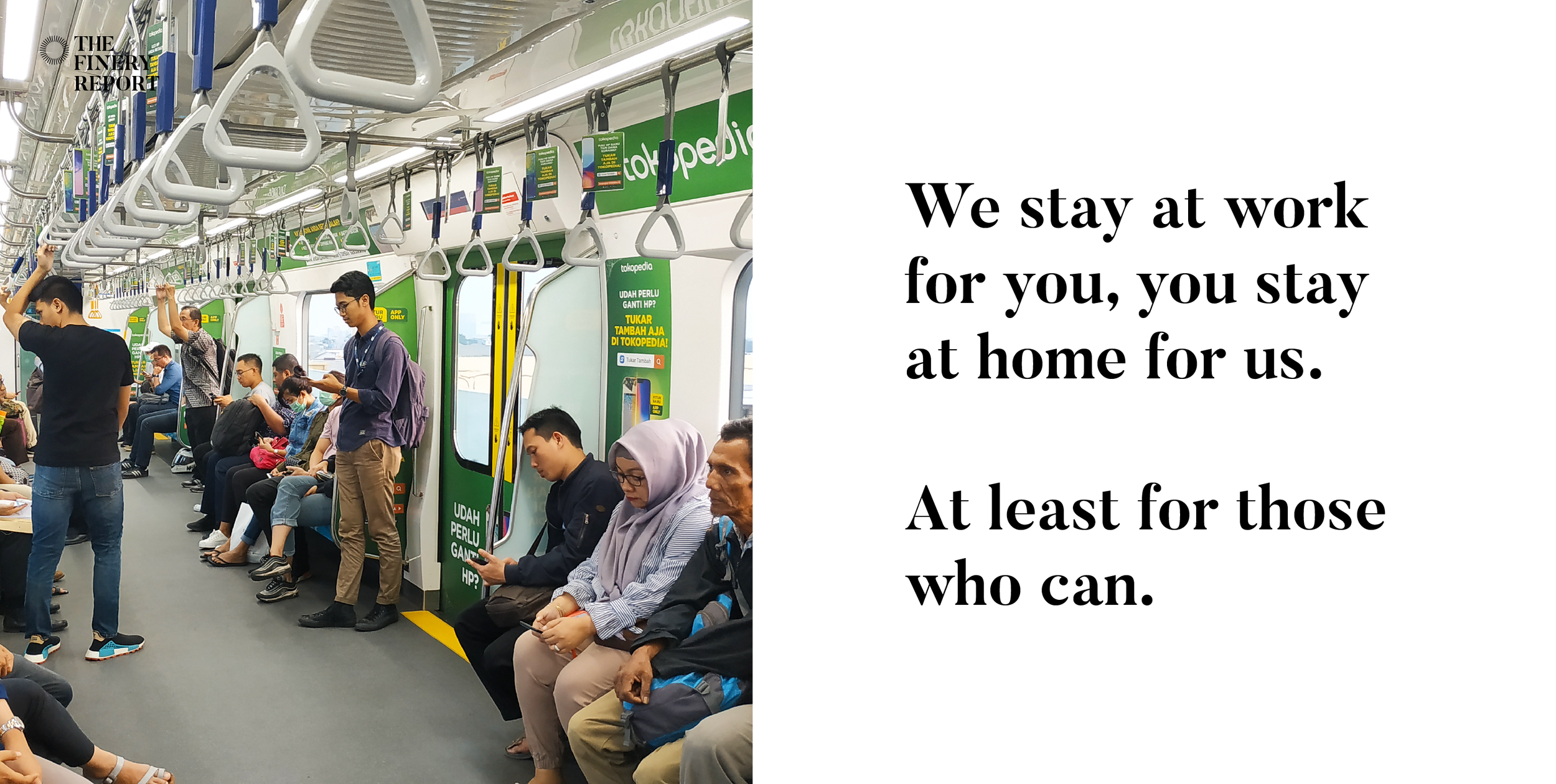To those who can't work remotely
“Listen, don’t just read the news. TV lies too if there are only 300 COVID-19 cases in the country,” said a person via group chat.
Weeks before the president announced the first two cases, the world and people have been questioning whether the country is truly free from COVID-19 whilst several imported cases from Singapore and Malaysia came from Indonesia.
As of 19 March, Indonesia's COVID-19 tally stood at 308 in 10 provinces. Compared to other countries, the mortality rate in Indonesia is 8.11% with 25 confirmed deaths and 15 recovered cases.
For some people, that number is seemingly low considering how many Indonesians travel overseas between December and February. There are also speculations on hospitals that secretly set up a ward for infected patients.
Preventive measures, such as closing down tourist spots, schools and universities and banning large gatherings have been implemented in several cities. A number of shopping malls in Jakarta have also reduced the opening hours.
However, the only issue with social distancing and working remotely from home is that not every profession can be done remotely. Take, for example, journalist.
“A friend of mine is in the list of ‘people under surveillance’ (ODP) because she was in contact with transportation minister who contracted COVID-19. The company tells her to come to work because she’s asymptomatic,” one of TFR writers said.
“Two journalists who cover Princess Diamond crews are infected as well,” said TFR journalist. “Saying the news lied about the numbers makes me sad. A journalist’s task is to report data from the government.”
Reporters and journalists are on the frontline of information dissemination. While those with the privilege to work from home sit in front of laptops waiting for news on COVID-19, reporters and journalists have to remain on standby on the premises.
Those in services sector are at risk too. Restaurants, fast food chains, markets and supermarkets can’t implement WFH method. They are at the frontline of the battle against COVID-19. If the food chain is completely shut, chaos will ensue.
Emma, a 27-year-old barista and food entrepreneur, told TFR via chat that she’s anxious but she has to go to work. “I’ve had flu since a month ago. I’ve also met with foreigners a lot. My sister experiences a slight fever and shortness of breath.”
“I’m feeling anxious inside, but I try to stay calm. I’m scared of being a carrier and spread it to my family. I go straight to the bathroom when I get home,” said Rachmah, a 29-year-old manager at a cat café.
Rhesa, a publicist at a popular restaurant, said loyal customers keep on coming and ordering food. “It becomes a dilemma. How do I earn money if I don’t work? What will happen if I go to work?”
In the creative industry, there are models, make-up artists, photographers whose jobs require physical attendance at a location or a studio.
Kimberly, a 20-year-old model, says, “You have to get your make-up and hair done. You have to work with more than five people on set. I don’t have the option to work from home or be able to say no to jobs as I only receive income per job I get booked for.”
Another model, Jasmine, voiced the same concern. “In the past two weeks alone, I have worked with people who were visibly sick during the shoot which inspired paranoia in myself. I’ve had another model coughed on my face; she was ill with a slight fever but was unable to back down from the shoot as she got sick only a day or two prior.”
The pandemic has put everyone at a vulnerable state. Not every profession can be done remotely. In some cases, companies don’t apply the work from home policy.
“I still go to office to supervise campaigns that will be launched soon,” said Sofi, a content writer at an advertising agency.
Nabila, another content writer, said, “My parents and friends are worried, but what can I do, I’m just an employee.”
Let’s not get started on couriers and ride hailing and delivery service providers. They have to be on the street. They are the ones who deliver groceries and food while thousands, possibly millions stay at home.
Lockdown is not an option and it may be complicated to execute given Indonesia's archipelagic geography. Referring to Achmad Yurianto’s statement in an interview on Deddy Corburzier’s YouTube channel, it will be difficult to track the patient’s contact history considering Indonesians could have relatives in other cities in other island.
If the government plans to lock down cities, it poses another question, is the government ready to deliver food and amenities to 270 million people across the country?
At this state, we can only stay home to flatten the curve, hope companies take employees health as priority and express the biggest gratitude to health practitioners, journalists and food servers.
Like they say, we stay at work for you, you stay at home for us. At least for those who can.


